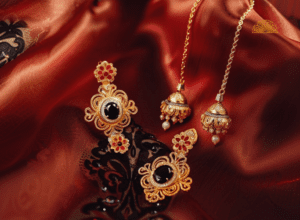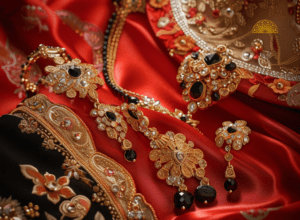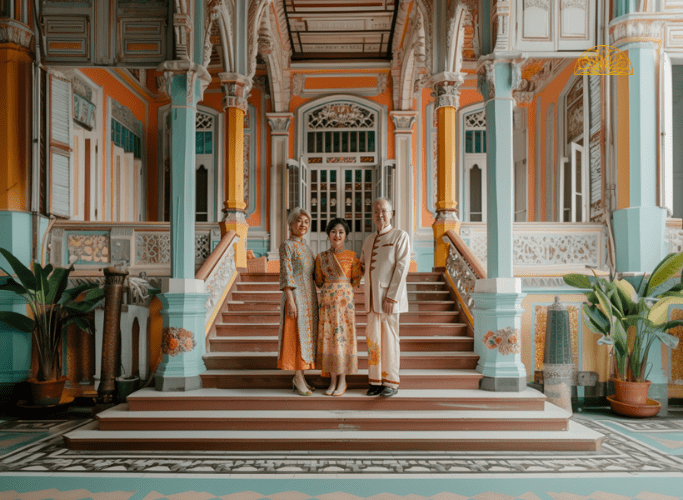Malaysian Peranakan culture is a unique blend of Chinese and Malay influences, which is reflected in many aspects of their lifestyle, including their jewellery. The intricate designs, exquisite craftsmanship, and use of gold and diamonds make Peranakan jewellery a true symbol of elegance and heirloom craftsmanship.
Understanding the Peranakan Culture
The Peranakan people in Malaysia carry a heritage that shimmers with history and artistry. Descended from Chinese traders who settled along the Straits centuries ago and married local Malays, they cultivated a culture that harmoniously blends Eastern elegance with local warmth. This vibrant mix of influences gave rise to Peranakan jewellery in Malaysia, pieces that are not only stunning works of art but also enduring symbols of identity, grace, and tradition.
So, what is Peranakan jewellery? It is a reflection of heritage in its purest form. Every filigree detail, gemstone setting, and gold clasp embodies stories of ancestry and artistry. The earliest gold Peranakan heirlooms were meticulously handcrafted, often adorned with enamel and colourful gemstones, and passed down as tokens of family legacy, a heritage passed down through gold heirlooms that connected generations.
These heirlooms were once the pride of Nyonya brides, gleaming against their kebayas during wedding ceremonies. Today, modern brides choosing Peranakan jewellery in Malaysia are reviving this timeless tradition, embracing its nostalgia while infusing it with contemporary sophistication. Many bridal collections now feature diamond Nyonya jewellery, blending the heritage of yesteryears with the sparkle of modern luxury. Diamond accents breathe new life into the traditional motifs of phoenixes and peonies, age-old symbols of prosperity and eternal love, making them perfect for both heirloom collectors and brides seeking cultural elegance.
Why is Peranakan jewellery so valuable? Beyond its precious materials, its worth lies in the centuries of craftsmanship and cultural meaning it holds. Each piece was painstakingly created by master goldsmiths using techniques that required precision, patience, and passion, often taking months to complete a single accessory. These traditional Peranakan accessories embody more than wealth; they carry the emotional weight of stories told through generations, bridging the past with the present.
Can you wear Peranakan jewellery for weddings? Absolutely, and many do so with pride. Wearing these pieces is not just a style statement; it’s a tribute to heritage and the continuity of family love. Whether it’s a finely wrought kerongsang brooch or a resplendent necklace accented with diamonds, each ornament transforms a bridal look into something deeply personal and culturally resonant.
And for those wondering where to buy Peranakan jewellery in Malaysia, there’s an increasing number of jewellers reviving the art, offering both antique heirlooms and contemporary reinterpretations. Whether you seek a genuine vintage treasure or a modern masterpiece that honours the same tradition, these jewellers allow you to carry a piece of Malaysia’s multicultural legacy, one that gleams with gold, diamonds, and memory.
The Origins of Peranakan People in Malaysia
The Peranakan community traces its roots back to the 15th and 16th centuries when Chinese traders started immigrating to Malaysia, particularly the Straits Settlements of Malacca, Penang, and Singapore. These early settlers married local Malay women and formed the foundation of the Peranakan culture that exists today.
Over the centuries, the Peranakan community has evolved and adapted to changing times while still holding on to its unique traditions and customs. Their language, known as Baba Malay or Peranakan Malay, is a distinct patois that combines elements of Malay with Hokkien, the Chinese dialect spoken by many early Chinese immigrants. This linguistic fusion is just one example of how the Peranakan culture continues to thrive through its blend of diverse influences
The Unique Blend of Chinese and Malay Influences
Peranakan jewellery reflects the community’s multicultural heritage by combining elements of Chinese and Malay design. Chinese motifs such as dragons, phoenixes, and flowers are intricately intertwined with Malay patterns and forms, creating a truly distinctive style that sets Peranakan jewellery apart from other traditional jewellery.
Each piece of Peranakan jewellery is a work of art that showcases the harmonious coexistence of different cultural influences. Materials such as gold, jade, and precious gemstones further enhance the beauty and significance of these pieces, making them highly sought after by collectors and enthusiasts alike. The intricate filigree work and delicate enamel detailing demonstrate the meticulous craftsmanship that goes into creating each piece of Peranakan jewellery, ensuring that this unique cultural heritage continues to be treasured for generations to come.

The Significance of Jewellery in Peranakan Culture
Jewellery is pivotal in Peranakan culture, serving as a visual language that communicates social status, religious beliefs, and family heritage. Each piece of jewellery carries profound symbolism and meaning, making it an essential component of Peranakan weddings, ceremonies, and everyday life.
The intricate craftsmanship and unique designs of Peranakan jewellery reflect the rich cultural heritage of the Peranakan community. Passed down through generations, these exquisite pieces are not only symbols of status but also treasured heirlooms that connect individuals to their ancestors and the traditions of the past.
Symbolism and Meaning Behind Peranakan Jewellery
Peranakan jewellery is not merely decorative; it tells stories and carries deep cultural significance. For example, the “kerongsang,” a traditional Peranakan brooch worn by women, symbolises fertility and marital bliss. The intricate floral motifs and vibrant gemstones used in Peranakan jewellery are believed to bring luck and prosperity to the wearer, making each piece a powerful talisman of protection and good fortune.
The intricate filigree work and vibrant gemstones found in Peranakan jewellery are a testament to the skilled craftsmanship of Peranakan artisans. These masterpieces are often meticulously handcrafted, with each detail carefully considered to create a piece that is not only beautiful but also meaningful.
The Role of Jewellery in Peranakan Weddings and Ceremonies
Peranakan weddings are grand affairs where jewellery takes centre stage. The bride is adorned with layers of gold necklaces, intricately crafted earrings, and stunning bracelets, all passed down through generations. These precious pieces not only showcase family wealth and social standing but also visually confirm the bride’s readiness to enter married life.
During traditional Peranakan ceremonies, jewellery plays a significant role in symbolising the union of two families. The exchange of intricate jewellery sets between the bride and groom signifies the merging of their families and the beginning of a new chapter together. Each piece of jewellery worn during these ceremonies holds deep cultural significance and serves as a tangible representation of the couple’s commitment to each other and their shared heritage.

The Artistry of Peranakan Jewellery
The artistry and craftsmanship of Peranakan jewellery are renowned for their attention to detail and intricate designs. Skilled artisans meticulously handcraft each piece, ensuring that no two are identical. This dedication to craftsmanship, combined with the use of high-quality materials, results in jewellery that exudes elegance and sophistication.
Originating from the Peranakan community, a blend of Chinese and Malay cultures found in Southeast Asia, Peranakan jewellery reflects a rich tapestry of heritage and tradition. Each piece tells a story with motifs and symbols of deep cultural significance. The jewellery serves as adornment and a link to the past, preserving the legacy of generations.
The Intricate Designs and Craftsmanship
Peranakan jewellery is known for its elaborate motifs and intricate filigree work. Flowers, birds, and mythical creatures are meticulously woven into the gold and silver structures, creating visually stunning pieces that capture the eye. These intricate designs showcase the skill and expertise of Peranakan craftsmen, who devote hours to perfecting every detail.
The filigree work in Peranakan jewellery is a testament to the patience and precision of the artisans. Each delicate swirl and curve is crafted with meticulous care, requiring steady hands and a keen eye for detail. The intricate patterns not only showcase the artisan’s skill but also reflect the cultural influences that have shaped Peranakan artistry over the centuries.
The Use of Gold and Diamonds in Peranakan Jewellery
Golds and diamonds are highly prized in Peranakan jewellery, representing wealth and prosperity. The ornate gold settings not only enhance the beauty of gemstones but also serve as symbols of the wearer’s social status. Diamonds, with their sparkling brilliance, are often incorporated into the designs, adding a touch of luxury and glamour.
In Peranakan culture, gold symbolises purity and eternity, making it a fitting choice for jewellery passed down through generations. The intricate patterns in gold settings not only showcase the craftsmanship of the artisans but also reflect the cultural values of the Peranakan community. Diamonds, with their rarity and beauty, are believed to bring good fortune and protection to the wearer, making them a prized addition to any piece of Peranakan jewellery.

The Preservation and Appreciation of Peranakan Jewellery
Preserving and appreciating Peranakan jewellery is essential to ensure that this cultural heritage continues to be enjoyed by future generations. Museums and collectors play a crucial role in safeguarding these precious heirlooms, allowing others to appreciate Peranakan jewellery’s intricate beauty and historical significance.
Peranakan jewellery’s intricate craftsmanship and vibrant cultural symbolism have captivated enthusiasts and historians alike for centuries. Each piece tells a unique story, reflecting the fusion of Chinese, Malay, Indian, and European influences that define Peranakan culture. These treasures, from ornate beaded necklaces to delicate gold filigree earrings, glimpse a bygone era of elegance and opulence.
The Role of Museums and Collectors
Museums worldwide house collections of Peranakan jewellery, showcasing its artistry and cultural significance. Exhibits provide valuable insights into the pieces’ craftsmanship, symbolism, and historical context. Collectors also play a vital role in preserving Peranakan jewellery, ensuring that these heirlooms are cherished and passed down through generations.
Through meticulous curation and conservation efforts, museums protect these exquisite pieces from the ravages of time, allowing visitors to marvel at their intricate details and rich cultural heritage. With their passion for Peranakan jewellery, collectors act as custodians of tradition, safeguarding these treasures for future generations to appreciate and admire.
The Modern Resurgence of Peranakan Jewellery Styles
In recent years, there has been a resurgence of interest in Peranakan jewellery styles. Many contemporary jewellery designers draw inspiration from Peranakan motifs and techniques, incorporating them into modern designs. This revitalisation ensures that Peranakan jewellery continues to evolve and remain relevant in today’s fashion landscape.
The fusion of traditional Peranakan aesthetics with contemporary design sensibilities has sparked a renewed appreciation for these cultural treasures. By blending intricate Peranakan motifs with modern materials and techniques, designers create stunning pieces that appeal to a new generation of jewellery enthusiasts. This innovative approach not only preserves the legacy of Peranakan jewellery but also ensures its continued relevance and popularity in the ever-changing world of fashion.
The Future of Peranakan Jewellery
Peranakan jewellery’s future faces challenges and opportunities as it navigates the changing landscape of cultural heritage and fashion trends. However, its timeless beauty, rich cultural heritage, and the allure of its intricate craftsmanship will continue to captivate enthusiasts around the world.
The Challenges and Opportunities for Peranakan Jewellery Makers
Peranakan jewellery makers must adapt to evolving consumer preferences while staying true to the traditional artistry that defines their craft. Embracing modern technologies and sustainable practices can offer new opportunities for innovation and market expansion, ensuring Peranakan jewellery’s continued relevance and appreciation.
The Influence of Peranakan Jewellery on Contemporary Fashion
Peranakan jewellery’s unique style and cultural significance have also made an impact on contemporary fashion. Designers and fashion enthusiasts worldwide are drawn to the intricate details, vibrant colours, and historical storytelling that Peranakan jewellery embodies. As a result, Peranakan-inspired designs are celebrated on runways and in fashion editorials, showcasing the enduring elegance and beauty of this remarkable cultural heritage.








Article
The Elegance of Peranakan Jewellery: Gold and Diamond Heirlooms in Malaysia
Explore the captivating world of Peranakan jewellery in Malaysia, where intricate designs and vibrant colours reflect a rich fusion of Chinese and Malay influences. From the symbolism behind each piece to the preservation efforts and modern resurgence, delve into these exquisite heirlooms' timeless elegance and cultural significance.